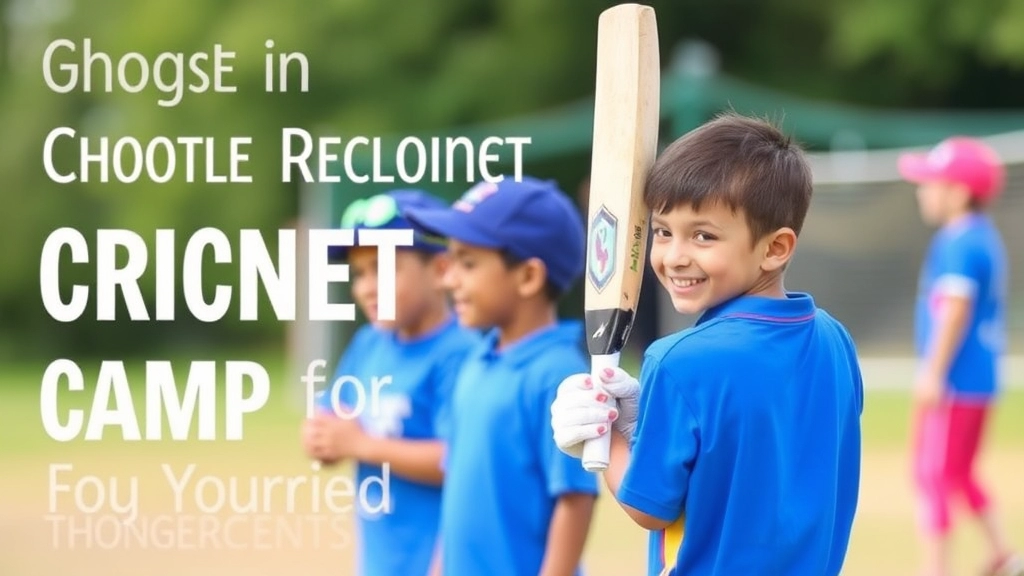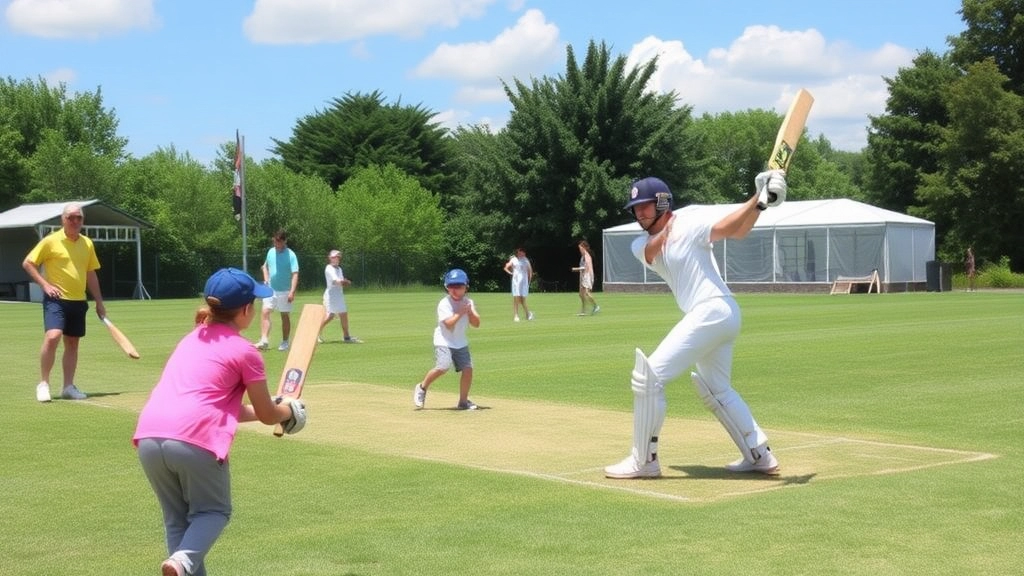Imagine a Summer of Cricket
Imagine a summer where your child not only hones their cricket skills but also learns invaluable life lessons. That’s the promise of a cricket summer camp. This article dives into what you can expect, the key skills taught, and the benefits your child will gain. From age-appropriate options to the daily schedule, we’ve got you covered.
The Role of Experienced Coaches
We’ll also explore how experienced coaches play a pivotal role in skill development and share real success stories from camp participants. Whether you’re curious about the teamwork and sportsmanship fostered at these camps or how to prepare your child for their first day, this comprehensive guide will answer all your questions.
Ready for an Unforgettable Summer?
Ready to make this summer unforgettable with a cricket summer camp? Let’s get started!
What to Expect from a Cricket Summer Camp
Real Questions and Worries
Alright, so you’re thinking about sending your kid to a cricket summer camp. But what exactly should you expect? Will it be worth the time and money? Will your child come back with improved skills or just a sunburn? Let’s cut through the fluff and dive right in.
What Happens at Cricket Summer Camp?
First off, cricket summer camps are designed to be intensive yet fun. They aim to boost your child’s cricket skills, teamwork, and overall fitness. But it’s not just about endless drills and practice matches. There’s a lot more to it.
Key Activities:
- Skill Development Sessions: These include batting, bowling, fielding, and wicket-keeping. Coaches break down techniques and offer one-on-one guidance.
- Fitness Training: Expect daily fitness routines to improve agility, strength, and stamina.
- Match Play: Regular matches to put those new skills into practice.
- Workshops and Seminars: Sessions on cricket strategy, mental toughness, and even nutrition.
What Makes It Fun?
You might be worried that your kid will get bored or overwhelmed. But trust me, these camps are designed to keep things engaging.
Fun Elements:
- Friendly Competitions: Mini-tournaments and skill challenges keep the excitement alive.
- Team-Building Activities: Games and exercises that focus on communication and collaboration.
- Guest Appearances: Sometimes, professional cricketers drop by for a chat or a quick demo. Imagine the thrill!
Who Will Be There?
The camp isn’t just for budding young cricketers. You’ll find a mix of kids at different skill levels. This diversity helps in learning and makes the experience richer.
Types of Participants:
- Beginners: Kids who are just starting and want to learn the basics.
- Intermediate Players: Those who have some experience and want to refine their skills.
- Advanced Players: Talented young cricketers looking to take their game to the next level.
What Will Your Kid Gain?
Sending your child to a cricket summer camp isn’t just about improving their game. It’s about holistic development.
Benefits:
- Improved Skills: Obvious, but worth mentioning. They’ll come back better at cricket.
- Fitness: A week or two of daily exercise will do wonders.
- Teamwork: Learning to work as part of a team is invaluable.
- Confidence: Nailing a new skill or winning a match can be a huge confidence booster.
Internal Linking Opportunities
Want to know more about the specific skills taught? Check out Engaging Summer Camp Curriculum Guide. Wondering about the right age for your child? Head over to Best Summer Camps for 4-Year-Olds.
Key Skills Taught at Cricket Camps

Ever wondered what your kid will actually learn at a cricket summer camp?
You’re not alone.
Parents often ask, “What skills will my child pick up?” and “Is it really worth it?”
Let’s break it down.
Batting Basics and Beyond
First up, batting.
- Your child will learn the fundamentals: grip, stance, and swing.
- They’ll practice different shots like drives, cuts, and pulls.
- Advanced tips? Yeah, they get those too—like reading the bowler’s hand and adjusting footwork.
Bowling Techniques
Then there’s bowling.
- Fast or spin? They’ll try both.
- Coaches will teach them about run-ups, grips, and follow-throughs.
- They’ll also work on accuracy and variations like yorkers and bouncers.
Fielding Fundamentals
Fielding is often overlooked, but not here.
- Catching, throwing, and ground fielding are drilled into them.
- They’ll practice under different conditions—sun, rain, you name it.
- Reaction time and agility exercises are part of the daily routine.
Understanding the Game
Cricket is a mental game too.
- Kids will learn about game strategy and field placements.
- They’ll understand the importance of communication and teamwork.
- Decision-making skills under pressure? Check.
Fitness and Conditioning
Don’t forget fitness.
- Camps include fitness drills to improve stamina and strength.
- Flexibility exercises to prevent injuries.
- Nutrition tips to keep them in top shape.
Real-Life Examples
Remember Ben Stokes?
He honed his skills at cricket camps.
Look where he is now.
Your kid could be next.
Why These Skills Matter
These skills aren’t just for cricket.
They teach discipline, focus, and resilience.
And let’s be real, they’re fun to learn.
Age-Appropriate Camp Options for Young Cricketers
Alright, let’s dive into the nitty-gritty of age-appropriate camp options for young cricketers. I know what you’re thinking: “Is my kid too young or too old for this?” Trust me, I’ve been there. So, let’s break it down.
Why Age Matters
First off, why should we care about age when it comes to cricket camps? Well, age-appropriate training ensures your child gets the right balance of fun and skill development. You wouldn’t want your 7-year-old in the same camp as a 15-year-old, right? Different ages have different needs.
Camps for the Little Ones (Ages 5-8)
Got a young one just starting out? Camps for ages 5-8 are all about introducing the basics. Think of it as Cricket 101. These camps focus on:
- Basic Skills: Simple batting, bowling, and fielding techniques.
- Fun Activities: Games that teach cricket skills without the pressure.
- Social Skills: Learning to play in a team and make new friends.
These camps are less about competition and more about having a blast while learning the ropes.
Camps for the Tweens (Ages 9-12)
Now, if your child is in the 9-12 age bracket, it’s time to step things up a notch. These camps are designed to hone their skills and introduce more structured play. Here’s what to expect:
- Skill Development: More focused training on batting, bowling, and fielding.
- Mini Tournaments: Friendly matches to get a taste of real competition.
- Teamwork: Emphasis on working as a unit and understanding team dynamics.
These camps strike a balance between learning and fun, making sure your child is both challenged and entertained.
Camps for the Teens (Ages 13-16)
Ah, the teenage years. Camps for ages 13-16 are where things get serious. These are for kids who are likely considering cricket as more than just a hobby. Here’s the lowdown:
- Advanced Techniques: In-depth coaching on advanced batting, bowling, and fielding.
- Competitive Matches: Regular matches to test skills under pressure.
- Fitness Training: Focus on physical conditioning to enhance performance.
- Mental Prep: Strategies to handle the psychological aspects of the game.
These camps are intense and geared towards those who might be eyeing a spot on a school or club team.
Finding the Right Fit
So, how do you choose the right camp for your child? Here are some quick tips:
- Assess Skill Level: Be honest about where your child stands. Are they just starting out, or are they more advanced?
- Check Camp Credentials: Look for camps with experienced coaches and good reviews.
- Ask for Recommendations: Sometimes the best advice comes from other parents who’ve been there.
Choosing the right camp can make all the difference in your child’s cricket journey. It’s not just about improving skills; it’s about building confidence, making friends, and falling in love with the game.
For more tips on selecting the perfect camp, check out our Summer Camp Guide. If you’re interested in exploring various camp themes, our article on Top Camp Themes for Summer Fun might be just what you need.
Benefits of Joining a Summer Cricket Camp

Ever wondered if signing your kid up for a summer cricket camp is worth it?
I get it.
You’re busy, your kid’s busy, and summer camps can be expensive.
But let’s break it down.
Why should your child join a summer cricket camp?
First off, learning cricket skills is just the tip of the iceberg.
Here’s what you’re really getting:
1. Physical Fitness
- Cricket isn’t just about swinging a bat or bowling a ball.
- It’s a full-body workout.
- Your kid will build strength, agility, and endurance.
2. Mental Toughness
- Cricket teaches focus and concentration.
- Handling pressure situations on the field can translate to better performance in school and life.
3. Social Skills
- Your child will make new friends.
- They’ll learn teamwork and communication.
- Being part of a team fosters a sense of belonging.
4. Discipline and Responsibility
- Cricket camps have schedules and rules.
- Your kid will learn the importance of punctuality and commitment.
5. Fun and Enjoyment
- Let’s not forget the most important part: having fun.
- Cricket camps mix training with games and activities, making it enjoyable.
Real Stories, Real Benefits
One mum I spoke to said her son’s confidence skyrocketed after a summer cricket camp.
He wasn’t just better at cricket; he was more outgoing and proactive in school projects.
Internal Links
Want to know how cricket camps develop teamwork and sportsmanship? Check out Section V.
Next Steps
So, what’s the verdict?
If you’re looking for a way to keep your child active, teach them valuable life skills, and let them have fun, a summer cricket camp is a no-brainer.
Get your kid signed up.
They’ll thank you for it.
And you’ll see the benefits long after the summer ends.
How Cricket Camps Develop Teamwork and Sportsmanship
Ever wondered how a cricket summer camp can turn your child into a team player? You’re not alone. Many parents worry about whether their kids will fit in, make friends, or even understand the importance of teamwork and sportsmanship. Let’s break it down and see how cricket camps tackle these concerns head-on.
The Magic of Teamwork in Cricket Camps
Cricket isn’t just about hitting sixes or taking wickets; it’s a team sport through and through. At cricket camps, kids learn that every player has a role, and success hinges on everyone pulling together. Here’s how camps make it happen:
- Group Drills and Activities: From fielding drills to batting practice, everything is done in groups. This setup teaches kids to rely on each other, communicate effectively, and build trust.
- Team Challenges: Camps often organise mini-tournaments or team-based challenges. These activities push kids to strategise together, celebrate wins, and learn from losses.
- Role Assignments: Coaches assign roles based on each child’s strengths and weaknesses. This helps kids understand their unique contribution to the team, fostering a sense of responsibility and belonging.
Building Sportsmanship from the Ground Up
Sportsmanship is more than just shaking hands after a match. It’s about respect, humility, and learning to handle both victory and defeat gracefully. Cricket camps instil these values through:
- Code of Conduct: Right from day one, kids are introduced to a code of conduct. They learn the basics like respecting opponents, playing fair, and adhering to the rules.
- Role Modelling: Experienced coaches lead by example, demonstrating how to behave both on and off the pitch. Kids naturally mimic these behaviours, embedding sportsmanship into their routine.
- Feedback and Reflection: After games or drills, coaches hold debrief sessions. Kids get constructive feedback and are encouraged to reflect on their performance and behaviour.
Real Stories, Real Impact
Take young Sam, for instance. He was shy and hesitant when he first joined the camp. But through team activities and constant encouragement from his coaches, he not only improved his cricket skills but also became a more confident team player. By the end of the camp, he was leading his team and cheering on his mates, win or lose.
Why Teamwork and Sportsmanship Matter
- Life Skills: These aren’t just cricket skills; they’re life skills. Teamwork and sportsmanship are qualities that will serve your child well beyond the cricket pitch.
- Social Connections: Kids make lasting friendships at camp. They learn to work with others, understand different perspectives, and build strong social networks.
- Emotional Growth: Handling wins and losses gracefully teaches emotional resilience. Your child learns to stay humble in victory and positive in defeat, a vital life lesson.
Ready to See Your Child Thrive?
Cricket camps are more than just a place to learn the game. They’re a breeding ground for teamwork and sportsmanship. So, if you’re on the fence about enrolling your child, think about the broader benefits. From making friends to learning life skills, the impact is profound.
Keyword: cricket summer camp
LSI Keywords: team player, sportsmanship, cricket skills, group drills, emotional resilience
Choosing the Right Cricket Camp for Your Child

Alright, so you’re thinking about signing your kid up for a cricket summer camp. Great idea! But how do you pick the right one?
What’s the Best Fit for Your Child?
First things first, you want a camp that matches your child’s skill level and age.
Ask yourself:
- Is my child a beginner or more advanced?
- What age group does the camp cater to?
- Does the camp offer different levels of coaching?
Location, Location, Location
You don’t want to spend hours driving every day.
Look for:
- Camps close to home
- Places with good facilities
Coach Credentials
Who’s coaching your kid matters a lot.
Check for:
- Experienced coaches
- Coaches with a good track record
- Maybe even some ex-pros
Camp Duration and Schedule
How long is the camp? Does it fit your family’s summer plans?
- Week-long camps
- Weekend camps
- Full-day vs. half-day options
Cost and Value
We all have budgets, right?
Compare:
- Cost vs. what you get
- Any extra fees (equipment, meals, etc.)
Safety and Supervision
Your child’s safety is non-negotiable.
Look for:
- Adequate supervision
- Safety protocols
- First-aid facilities
Reviews and Recommendations
Word of mouth is gold.
Ask around:
- Other parents
- Online reviews
- Local cricket clubs
Trial Sessions
Some camps offer trial sessions. These are golden opportunities to see if the camp is a good fit before committing.
Success Stories
Check if the camp has a history of producing skilled players. This can be a good indicator of quality.
Get Your Child’s Input
Don’t forget to ask your child what they want. They’re the ones attending, after all.
Daily Schedules and Activities at Cricket Camps
Wondering what a day at a cricket summer camp looks like? You’re not alone. Many parents and young cricketers have questions about what happens from dawn till dusk at these camps. Let’s break it down so you know exactly what to expect.
Morning Kick-Off: Warm-Ups and Drills
Every day at a cricket camp starts with a bang. Warm-ups are essential to get those muscles ready for action. Expect a mix of light jogging, stretching, and dynamic exercises. This isn’t just about getting the body moving; it’s about preventing injuries and getting into the right mindset.
- Stretching routines to enhance flexibility
- Light jogging to boost cardiovascular health
- Dynamic exercises to get the blood pumping
Skill Development Sessions
Once everyone’s warmed up, it’s time to dive into the nitty-gritty. Skill development sessions focus on the core aspects of cricket:
- Batting techniques â from stance to stroke play
- Bowling drills â perfecting your line and length
- Fielding practice â catching, throwing, and positioning
These sessions are usually broken down into smaller groups so that each camper gets individual attention. Coaches provide real-time feedback, helping young cricketers fine-tune their skills.
Mid-Morning Break: Snack and Hydration
After a couple of intense hours, it’s time for a break. Hydration and nutrition are crucial, so camps typically offer healthy snacks and plenty of water. This pause is also a good time for campers to socialise and build camaraderie.
Strategy and Game Sense
Next up is a focus on the mental side of the game. Understanding cricket strategy is as important as physical prowess. These sessions might include:
- Game simulations to understand different match scenarios
- Video analysis of professional games to pick up tips
- Group discussions to foster teamwork and strategic thinking
Lunch Break: Refuel and Relax
A well-balanced lunch is provided to ensure campers have the energy for the rest of the day. This is also a good time for some downtime, allowing kids to recharge both physically and mentally.
Afternoon: Match Play and Scrimmages
The afternoon often features match play, where campers can put their skills and strategies to the test. These games are usually supervised by coaches who offer guidance and feedback. It’s a great way to learn how to apply skills in a real-game context.
- Intra-camp matches to test skills in a competitive setting
- Scrimmages to practice game scenarios
- Role-specific drills to focus on individual positions
Evening Wind-Down: Cool-Down and Reflection
As the day wraps up, a cool-down session helps in muscle recovery and injury prevention. Stretching and light exercises are followed by a reflection period where campers can discuss what they learned and set goals for the next day.
- Cool-down stretches to aid muscle recovery
- Reflection sessions to internalise the day’s learning
- Goal-setting for continuous improvement
Wrap-Up: What Did We Learn Today?
Every day ends with a quick debrief. Coaches summarise the day’s activities, highlight key learnings, and give pointers for the next day. This helps campers to keep track of their progress and stay motivated.
Experienced Coaches and Their Role in Skill Development

Ever wondered why some kids come back from cricket camp with skills that seem to have skyrocketed overnight?
It’s all about the coaches.
Why Experienced Coaches Matter
Let’s face it – not all coaches are created equal.
Some are just there for the paycheck.
Others? They live and breathe cricket.
And it’s those passionate coaches who make all the difference.
What Makes an Experienced Coach Stand Out?
- Real-World Experience: They’ve been in the trenches, played the game at high levels, and know what it takes to succeed.
- Personalised Feedback: They don’t just bark orders. They observe, understand each kid’s strengths and weaknesses, and offer tailored advice.
- Mentorship: Beyond just cricket skills, they teach life lessons. Discipline, perseverance, and teamwork.
How Coaches Impact Skill Development
- Focused Training Sessions: They break down complex techniques into simple, actionable steps.
- Game Situations: Instead of just drills, they simulate real game scenarios. This helps kids think on their feet.
- Consistent Feedback: Immediate and constructive feedback helps kids correct mistakes on the spot.
Success Stories
Take Jamie, for instance.
He joined a summer cricket camp with zero experience.
By the end of the camp, he was not only playing matches but also captaining his team.
How?
An experienced coach who saw potential and nurtured it.
What to Look for in a Coach
- Credentials: Have they played or coached at a high level?
- Testimonials: What do other parents and kids say about them?
- Approachability: Are they someone your child will feel comfortable with?
Choosing the Right Camp
When picking a cricket camp, the quality of the coaches should be a top priority.
Look for camps that highlight their coaching staff.
Read reviews.
Ask questions.
Success Stories from Cricket Camp Participants
Ever wondered if a cricket summer camp is worth it? Let me tell you, the answer is a resounding “Yes!” And don’t just take my word for itâlet’s dive into some real-life success stories that show how these camps transform young cricketers into future stars.
From Rookie to Rising Star: Meet Jamie
Jamie was your typical 12-year-old who loved cricket but had never played in an organised setting. His parents were hesitant about sending him to a summer cricket camp, worried it might be too intense. But guess what? Jamie thrived. Within just a few weeks, he went from barely knowing how to hold a bat to scoring half-centuries in local matches.
What Worked for Jamie:
- Personalised Coaching: Coaches focused on his strengths and weaknesses.
- Intense Practice Sessions: Daily drills helped him improve rapidly.
- Team Activities: Boosted his confidence and communication skills.
Ella’s Journey: Breaking Stereotypes
Ella, a 14-year-old girl, always faced scepticism about her cricketing abilities. She joined a cricket camp determined to prove everyone wrong. Fast forward to the end of summerâElla was not only the team captain but also the highest wicket-taker.
Ella’s Game-Changers:
- Specialised Bowling Clinics: Enhanced her techniques.
- Leadership Workshops: Helped her take charge of the team.
- Peer Support: Built a network of friends who encouraged her.
The Transformation of Sam: From Shy to Social
Sam was an introverted 10-year-old who struggled with teamwork. His parents enrolled him in a cricket camp hoping he’d come out of his shell. By the end of the camp, Sam was not only a better cricketer but also a more confident individual. He even organised a mini-tournament for his schoolmates!
Key Factors for Sam:
- Team-Building Exercises: Encouraged him to interact more.
- Role-Playing Games: Improved his social skills.
- Mentorship: Coaches acted as role models, guiding him both on and off the field.
Why These Stories Matter
These success stories aren’t just about cricket; they’re about personal growth, overcoming challenges, and building lifelong skills. Cricket camps offer a structured environment where kids can focus on their game while also developing crucial life skills.
Real Questions, Real Answers
- “Will my child fit in?” Absolutely. Camps are designed to be inclusive and supportive.
- “Is it worth the money?” Given the skills and confidence your child will gain, it’s a solid investment.
- “What if my child isn’t that good?” That’s the point of the campâto get better!
If you’re looking for more options, check out our affordable summer camps guide. And for those interested in tech, explore our AI summer camps to learn, explore, and innovate.
How to Prepare Your Child for a Cricket Summer Camp
Worried about sending your child to their first cricket summer camp?
I get it. It can be nerve-wracking.
But don’t sweat it.
We’ll break it down step-by-step to make it easy for both you and your child.
Keyword: cricket summer camp
Gear Up: What to Pack
First things first, let’s talk gear.
Your child will need:
- Cricket bat â Make sure it’s the right size.
- Protective gear â Helmets, pads, gloves. Safety first.
- Cricket whites â Comfortable and breathable.
- Water bottle â Hydration is key.
- Sunscreen â Avoid those nasty sunburns.
- Snacks â Healthy and energy-boosting.
Get Physically Ready
Cricket isn’t just about swinging a bat.
It’s a full-body sport.
Here’s how to get them in shape:
- Warm-up exercises â Stretching, jogging, and light workouts.
- Practice drills â Bowling, batting, and fielding.
- Cardio â Running or skipping to build stamina.
Mental Prep: Set Expectations
Let’s face it.
The mental game is just as important.
Talk to your child about:
- Goals â What do they want to achieve?
- Teamwork â Emphasise the importance of working with others.
- Sportsmanship â Winning is great, but playing fair is better.
Get Familiar with the Camp
Knowledge is power.
Check out:
- Camp schedule â Know the daily routine.
- Coaches â Who are they? What’s their background?
- Facilities â What’s available? Nets, pitches, etc.
Social Prep: Making Friends
New environments can be daunting.
Encourage your child to:
- Be open â Smile, introduce themselves.
- Participate â Join in all activities.
- Ask questions â Coaches and peers are there to help.
Final Checklist
Before the big day, double-check:
- All gear packed?
- Physical fitness on point?
- Mentally prepared?
- Familiar with the camp?
Real Stories, Real Success
Take it from other parents who’ve been there.
Sarah, a mum from London, says, “My son was nervous, but after a week, he was hooked. The camp built his skills and his confidence.”
Keyword: cricket summer camp
Got more questions? Check out our other sections on finding the perfect summer camp fit and summer camp packing essentials.
Ready to get started?
Let’s make this summer unforgettable.
Frequently Asked Questions (FAQs) About Summer Cricket Camps
What skills will my child learn at a cricket summer camp?
Your child will learn a range of skills including batting, bowling, and fielding. They’ll also gain an understanding of game strategy, fitness, and conditioning.
Is a cricket summer camp worth the investment?
Absolutely. Besides learning cricket skills, your child will develop physical fitness, mental toughness, social skills, and discipline. Plus, it’s a fun and engaging way to spend the summer.
How do I choose the right cricket camp for my child?
Consider factors like your child’s skill level, the camp’s location, the credentials of the coaches, the camp duration, cost, safety protocols, and reviews from other parents.
Why are experienced coaches important in a cricket camp?
Experienced coaches bring real-world experience, provide personalized feedback, and offer mentorship. They play a crucial role in your child’s skill development and overall experience at the camp.
What should I look for in a coach?
Look for coaches with high-level playing or coaching experience, positive testimonials, and an approachable demeanor. These qualities ensure your child will receive quality training and feel comfortable.
Can my child attend a trial session before committing to a camp?
Many camps offer trial sessions. These are excellent opportunities to determine if the camp is a good fit for your child before making a full commitment.
What are the benefits of joining a summer cricket camp?
Beyond learning cricket skills, your child will improve their physical fitness, mental toughness, social skills, and discipline. Plus, they’ll have a lot of fun.
How long do cricket camps usually last?
Cricket camps vary in duration. Options include week-long camps, weekend camps, and full-day or half-day sessions. Choose one that fits your family’s schedule.
What safety measures are in place at cricket camps?
Reputable camps have adequate supervision, safety protocols, and first-aid facilities to ensure your child’s safety.
Are there any success stories from cricket camps?
Yes, many successful players, like Ben Stokes, honed their skills at cricket camps. These camps can be a stepping stone to greater achievements in cricket and beyond.
References
-
England and Wales Cricket Board – Junior Cricket Camps
-
Cricket Australia – Kids Cricket Camps
-
KreedOn – 10 Best Cricket Academies in India

